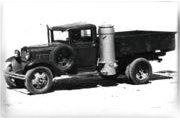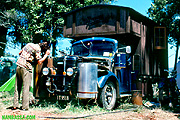
| << previous page | next page >> | |||||||||||||
Dominica as a Model for a Green Energy Future.Dominica’s Two Problems: Oil is too expensive and Bananas are too cheap. We believe these problems are artificial. If oil is too expensive – don’t buy it. If bananas are bought from you too cheaply – don’t sell them, find other uses for them. Use bananas to replace oil. In Europe, rapeseed oil, which farmers once sold too cheaply, is now being used to produce diesel fuel. And the price of the rapeseed oil began to rise. In Malaysia, the same thing happened with palm oil: they began to make diesel fuel from it and prices on world markets have become to creep up. There are inexorable market laws. How can Dominica turn down the oil purchase and use cheaper bananas instead of oil? At the time of the Second World War the European superpower states - the Soviet Union and Germany had trouble procuring fuel oil. They destroyed each others supplies, and they had shortages. In the rear people did everything possible to substitute for oil, and cars started to work on wood gas. A simple device was fastened onto the car. It looked like a barrel. It contained gas made from organic material. Russians used birch wood and Germans used brown coal in briquettes or dust. In "the barrel" the wood decomposes under high temperature with no oxygen, producing a gas, which powered the engine.
On the Photo Pic. 3 - Wood gas electric power generator station. The barrel’s diameter is about 15 feet and the entire installation is about 23 feet high. It develops 2.5 megawatts time consuming 2 thousand pounds of wood waste per hour. In principle, it can work in any waste in which humidity is under 50%, e.g.; unusable car tires, plastic bottles, dry grass, and household garbage. Its structure. 2.5 megawatts – is it a lot or a little? Dominica’s average capacity is 10 megawatts with peak loads to 15. Just 4 such stations would suffice to meet Dominica’s needs. |
|||||||||||||
Where to get fuel for this installation?Garbage will run out (that’s good!) you need to have a stable source of organics. In Russia we have wood shoots of two plants – poplar and willow-tree, which in 5 months grows shoots about 10 feet tall. We get about 1.5 tons from 1 hectare per month, or about 1200 per acre per month. Corn combines harvest an acre on a few hours. These plantations require no maintenance: they simply re-grow. Each power station requires plant planting about 1000 acres. In the tropics plants grow much more rapidly, so perhaps less land is needed per station. Dimensions of plantations can be reduced, if coconuts, domestic refuse, etc. are also used. You can cultivate sunflower; even in northern areas it yields a great mass of organics. We estimate each Dominican family will spend approximately 22 pounds of fuel per day. You can set up a system of substantial discounts for electricity for those who provide fuel. Many people will be able to plant sunflower, corn and other crops around their homes. In Russia husked corn gives 8 tons of grain/acre, but complete ears are yielded at 10 tons/acre, thus reduced by one third sown area required. Corn stalks are more than 50% moist, but still can be converted into gas by another technology, biogas, discussed below. |
|||||||||||||
| << previous page | next page >> | |||||||||||||




